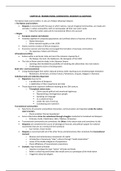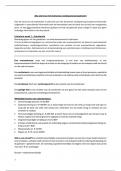Samenvatting
Summary Actors in World Politics: Summaries from The Transnational Studies Reader
- Instelling
- Universiteit Leiden (UL)
This 18-page document contains summaries of Chapter 19, 27, 39, 47 from The Transnational Studies Reader and "Globalisation, Transnational Political Mobilisation, and Networks of Violence" by Fiona B. Adamson (2005). All of these are assigned readings for the Actors in World Politics lectures.
[Meer zien]






